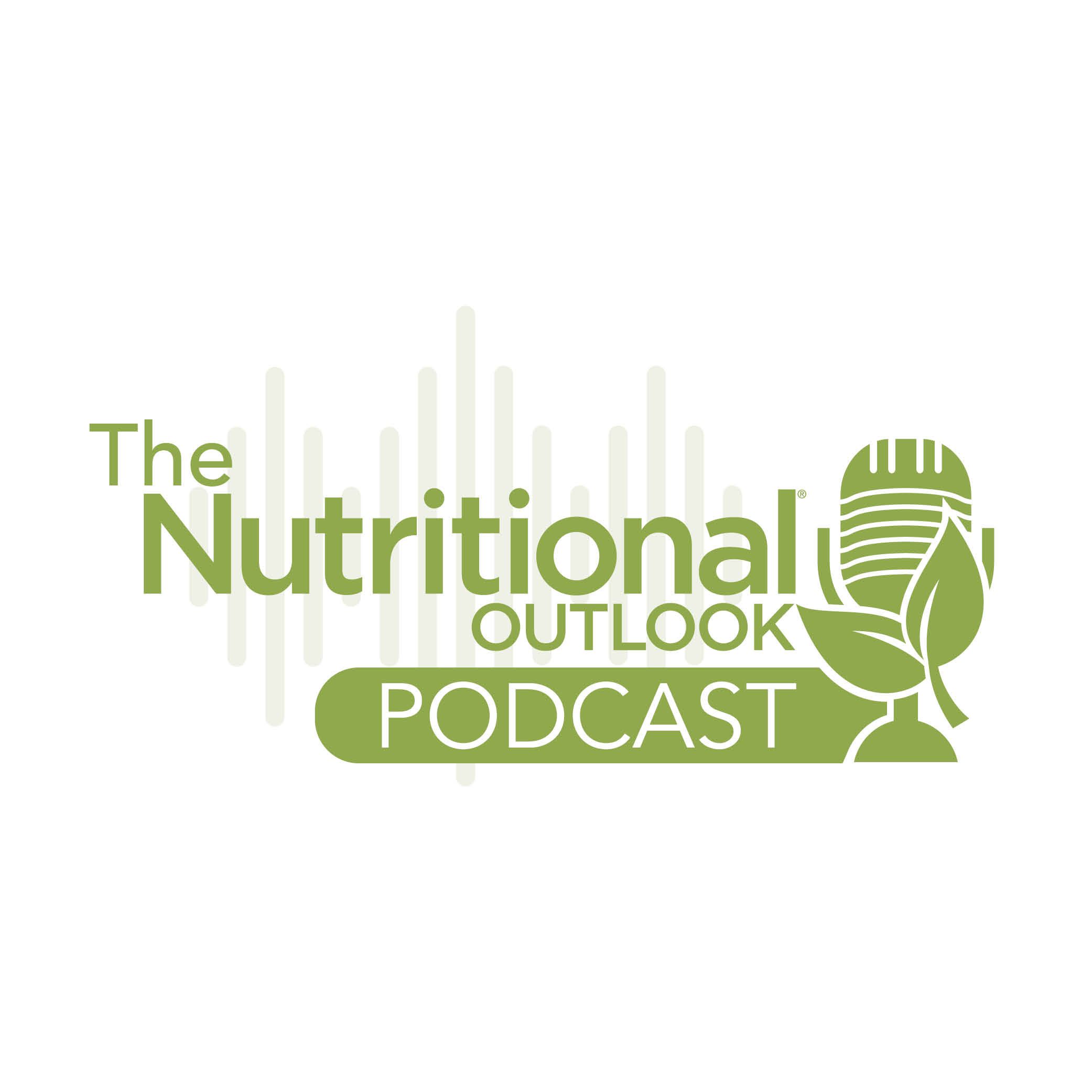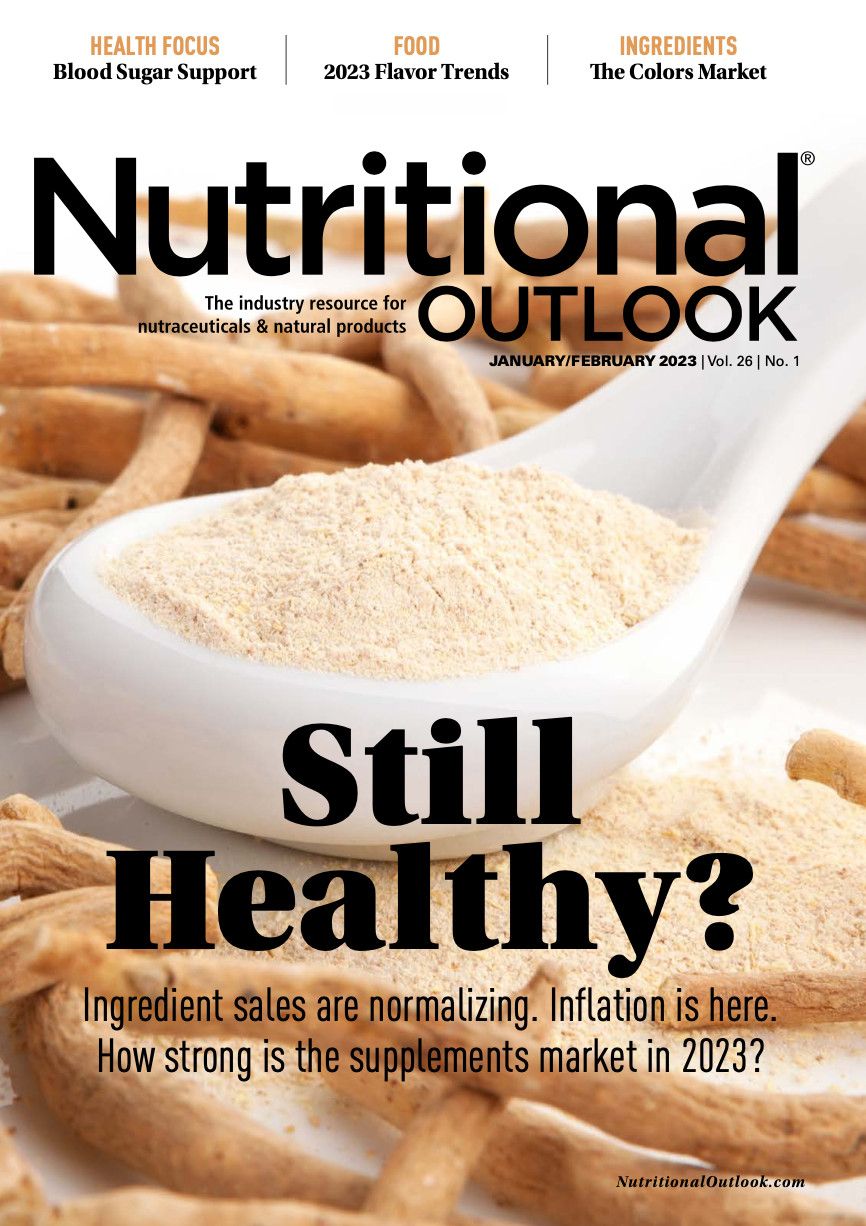Listen Now!

Don’t miss the January episode of The Nutritional Outlook Podcast in which we interview Scott Dicker and Haleigh Resetar of SPINS about all of our editors’ picks for 2023 Ingredients to Watch.
Microbiome ingredients are among the most profitable on the market and continue to grow as consumers learn about the microbiome’s impact across multiple health outcomes.
Digestive health is one of the most profitable dietary supplement categories. According to data from SPINS (Chicago), digestive health was the third-leading health condition in the mainstream U.S. dietary supplements channel in 2022, with $912 million in sales. In the U.S. natural supplements channel, digestive health ranked first, with $148 million in sales in 2022. Probiotics remain a mainstay ingredient in both channels, ranking third on the list of top-25 bestselling ingredients in the U.S. mainstream supplements channel in 2022, with $800 million in sales. Probiotics ranked even higher in the natural channel, topping the list of bestselling ingredients with $120 million in sales in 2022. Last year, probiotic sales stayed stable, growing 2.1% in the mainstream channel over the previous year and declining just 2.1% in the natural channel.
While probiotics remain a sure bet, other digestive health and microbiome-supporting ingredients are thriving, showing healthy growth last year. For example, digestive enzyme sales within the mainstream digestive health category grew 20% to $29 million in 2022. This is the second year in a row that the ingredient experienced double-digit growth in that category and channel; in 2021, digestive enzyme sales grew 42% over the previous year. Meanwhile, in the mainstream digestive health category, the dietary enzyme lactase saw nearly 15% sales growth in 2022, bringing in $55 million.

Don’t miss the January episode of The Nutritional Outlook Podcast in which we interview Scott Dicker and Haleigh Resetar of SPINS about all of our editors’ picks for 2023 Ingredients to Watch.
Psyllium, a prebiotic fiber found in popular products like Metamucil, remains a top-selling ingredient within the mainstream U.S. supplements channel and saw nearly 7% sales growth in 2022, bringing in $262 million. In the digestive health market, psyllium sales grew 12% in the mainstream market and 16% in the natural channel. It was also the number-one bestselling ingredient in the mainstream cardiovascular health market.
The digestive health category is well-established, but the space is also quite diverse. Movement in other microbiome-supporting ingredients point not only to the growing market for digestive health products beyond probiotics but also perhaps an increasing acceptance among consumers that the health of the gut may in fact be the source of overall health. During the height of the pandemic, for example, consumers were turning to probiotics for not just digestive health but also immune support. In those stressful times, knowledge of the gut-brain axis also grew, and people turned to probiotics to support stress. Therefore, it’s only natural for consumers to explore other options in the digestive health space as they seek ways to improve their health.
“I definitely think we’re starting to see more of a consensus overall of how much more these ingredients can do for the body and just how much digestive health affects the body overall,” says Haleigh Resetar, corporate communications specialist SPINS. “When you’re on social media, you’re constantly seeing videos talking about ‘heal your microbiome with these steps,’ ‘take these supplements to improve your digestive health,’ ‘here’s five reasons to do this’—everything that [the microbiome] can do.”
As our understanding of the microbiome advances, a more targeted approach is desirable, says Irfan Qureshi, vice president, product development and quality assurance, Healthy Directions. This is particularly true as consumers begin to seek more-specific health outcomes from these digestive health products. “Studies continue to show that specific strains within a species of bacteria can have distinct benefits,” he explains. “Thus, all strains don’t behave the same way, which is why probiotic usage should be targeted to the benefits desired by an individual person.”
“We have seen more customers include a probiotic as a core supplement due to the importance of probiotics in supporting immune health as well as digestive health,” says Eric Cohen, senior brand manager, Private Brands, The Vitamin Shoppe. “Probiotic formulas may also contain clinically studied strains that provide additional health benefits, and label claims beyond digestive and immune health. As an example, The Vitamin Shoppe Ultimate 10+ probiotics feature a respiratory health label claim. Respiratory support is an important immune-related benefit that has resonated with customers since the pandemic.”
Digestive enzymes offer their own targeted benefits—such as aiding in the digestion of dairy, in the case of lactase. Some animal research even shows that digestive enzymes may have positive effects on the composition of the microbiome.1
Additionally, prebiotics are becoming more recognized as a complement to probiotic supplementation because they feed bacteria and can help proliferate them within the gut. Sometimes, prebiotics alone may be the ideal solution as the consumption of different kinds of fiber (soluble or insoluble) serve different gut health needs (such as aiding in constipation) while also feeding beneficial bacteria in the gut. Prebiotic fibers are not new to the market, but marketing products as prebiotics and touting their microbiome benefits is a newer trend. Products combining probiotics and prebiotics, sometimes referred to as synbiotics, are also becoming more popular.
“Customers are actively seeking probiotic products that also contain prebiotics,” says Cohen. “The prebiotics not only act as food for the probiotics in the capsule; they may also help support a healthy balance of the trillions of flora in our intestinal tract. In response to the growing consumer awareness of prebiotics, The Vitamin Shoppe launched Vthrive Advanced Microbiome Support, a unique, standalone prebiotic formula containing two clinically studied prebiotic ingredients to support the diversity and balance of intestinal flora.”
The digestive health space has so much to offer its growing audience, but there may be a learning curve for consumers that manufacturers should consider. “There remains confusion among consumers about the value of probiotics, prebiotics, and other digestive health ingredients that ultimately will require significant education on the part of ingredient suppliers as well as brands selling finished products,” explains Qureshi.
With so many different products to choose from, choosing the right product can be intimidating for consumers, but straightforward, creative, and honest marketing can go a long way in guiding customers toward your products. And while supplement formats such as capsules are not going anywhere, alternative dosage formats such as functional foods and beverages are a great way to engage new customers. More than looking for specific ingredients, such as probiotics or psyllium, consumers are more likely to try unique product formats that tout digestive health benefits, says Resetar.
“I think when you’re looking more broadly at the digestive health category overall, I think we’re more likely to see a lot of consumers trying these prebiotics and probiotics because they have seen it in a new form, such as these functional sodas and these functional snacks that include these ingredients,” she explains. “I think that product innovation and that unconventional introduction to these ingredients is going to act more as a gateway into the digestive health category.”
Reference

From ingredient science to consumer trends, get the intel you need to stay competitive in the nutrition space—subscribe now to Nutritional Outlook.
Radicle Science has launched Radicle Discovery Gen 2
July 22nd 2025Radicle Science announced the launch of the latest version of its proof-as-a-service platform, Radicle Discovery Gen 2, which combines rigorous clinical trials, AI, data, and crowdsourcing to validate the effects of natural products across diverse populations.